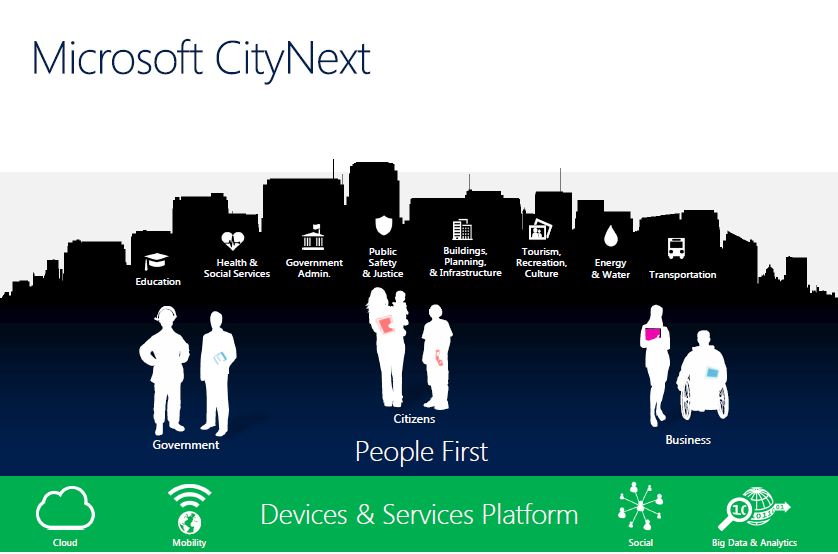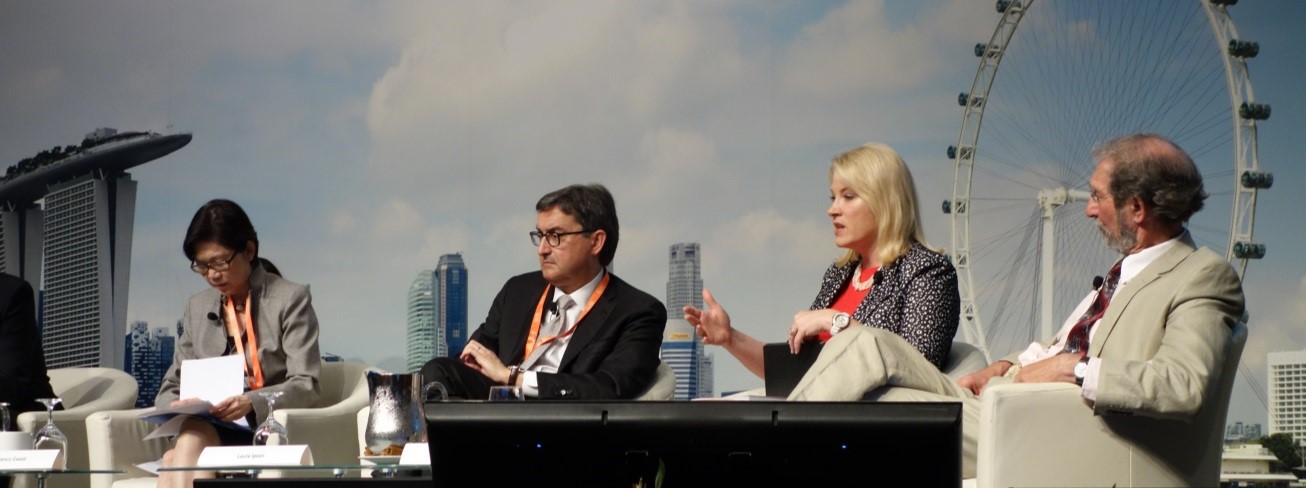At the World Cities Summit on 3 June 2014, Laura Ipsen, Corporate Vice President of Worldwide Public Sector at Microsoft, spoke at a plenary discussion titled “The Next Urban Decade: Critical Challenges & Opportunities“. The panel included the Chairman of the Lee Kuan Yew Center for Innovative Cities, the Minister of Construction and Urban Development of Mongolia, a Director from the San Francisco Mayor’s Office, the President of the World Resources Institute, the Group Chief Executive of Growth Markets at Accenture, as well as a Distinguished Professor from the Santa Fe Institute.
In his opening speech to the plenary, Dr. Peter Ho, Chairman of the Urban Redevelopment Authority, Singapore, talked about how cities need to remain equitable, inclusive and liveable for their people, while being resilient and adaptable at the same time. He also highlighted how urbanization is affecting global trends in complex ways, leading to more uncertainty and problems for cities. In fact, for the first time in history, cities account for more than 50 percent of the world’s population.
As cities experience this massive population shift, they are also confronting budget cuts, limited natural resources, aging citizens, outdated infrastructure, growing energy demands, and rigorous regulatory requirements.
To tackle these issues, city leaders need to take a people-first approach to innovation that empowers citizens, business and governments to collaborate to go beyond technology capacity by leveraging human capacity.
“At Microsoft, we have been working with cities for many years, but we now have an opportunity to leverage the four megatrends: mobile, social, big data and cloud, in ways we haven’t done before,” said Laura.
“At the same time, when we think of our approach to cities, we think about a people-first approach and most importantly, creating partnerships with large companies like Accenture, and with very small startups like you see at hackathons. These partnerships are creating solutions across education, health, government administration, public safety, planning and infrastructure.”
These partnerships as well as direct feedback from cities led Microsoft to build a foundation for CityNext based on three pillars: Transformation – how do we help cities transform infrastructure operations? Engage – how do we help cities better engage their citizens? And lastly, Accelerate – how do we accelerate innovation, opportunities and jobs in the current environment?

During the plenary, Laura cited several examples of cities that are transforming operations and infrastructure; engaging citizens and businesses; and accelerating innovation and opportunity:
- In the area of transportation, the cities of Auckland and Manchester are working with Big Data to help residents better plan their journeys on the public transport system.
- The tourist destinations of Hainan and Barcelona are harnessing data and taking advantage of people-ready technology to attract and retain more tourist visits, expand the local economy and create employment for citizens.
- To protect and advance citizen safety, Microsoft worked with the city of New York to develop an intelligent crime monitoring system – the Microsoft Domain Awareness System. The state-of-the-art solution aggregates and analyzes public safety data in real time and combines artificial intelligence analytics with video from around a jurisdiction to identify potential threats and protect critical infrastructure.
- The City of Kathmandu, in partnership with CITYNET and Microsoft, held a CityApp “Appathon” in March this year where 103 developers participated, building apps over two days to solve urban problems. Solutions included “Safety Whistle”, an “in case of emergency” solution for individuals; healthcare, transportation, and collaboration applications.
- In London, a local company built an app called Love Clean London that allows citizens to report problems in the city, and have them resolved. It has enabled citizens to become instant and free city inspectors!
- Citizen-centric apps are enabling people to directly engage and interact with their city governments for services that make life easier and more convenient. For PUB, Singapore’s national water agency, developing the MyWaters app for Windows Phone and Windows 8 has enabled the agency to better connect with the community and facilitate two-way dialogue.
The foundation of Microsoft CityNext is the belief that citizens – including the young people currently being educated to be leaders of tomorrow – can be the best partner in solving the challenges their cities face. “Technology shouldn’t displace jobs, technology should enable jobs of the future.”
According to Laura, over 77 percent of jobs in the next decade will require some sort of IT skills. That is why education and skills is something that both the public and private sectors have to invest in now. “We do that at Microsoft with programs like BizSpark and Partners in Learning. We’ve invested over US$750 million in a platform just for teachers – to show them how to use technology better in the classroom.”
“At the end of the day, city leaders have a great opportunity and a prime role to play in enabling innovation in cities around the world. Leveraging Microsoft’s people-first approach through CityNext provides them with a platform for economic development and job growth in their cities,” she said.
For more information on how Microsoft CityNext is making an impact in cities across Asia, please visit https://news.microsoft.com/apac/presskits/citynext-asia-pacific-news-room/.







